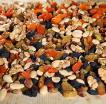How to store cheese properly.

.
It is believed that the ideal temperature for storing cheese is 12°C.
Cheese – «selfish», so each type of cheese should be stored separately. This will avoid the mixing of flavors and smells. In addition, noble mold can easily transfer to other cheeses, so this rule should never be broken when storing especially soft cheeses.
Cheeses should be stored wrapped in the refrigerator because they absorb odors easily and dry out quickly. You should leave the original wrapper intact or wrap the cheese in wax paper, foil or clear film. Cheese needs to breathe, so it should not be vacuum packed. It is better to store it under a special hood or wrapped in aluminum foil, in which pierce small holes. Cheese will keep longer if the wrapper is changed every few days. Hard cheese in one piece will keep longer if wrapped in a clean, damp cloth.
By the way, cheese won't dry out if you put a lump of sugar next to it and cover it with a lid.
Hard cheese will keep longer if it's wrapped in a clean, damp cloth.
The harder the cheese, the longer it will keep. Soft cheeses should be eaten as soon as possible, while harder and drier cheeses, such as cheddar, can keep for almost a month if properly wrapped. If stored properly, hard cheese will retain its flavor for 7-10 days, while soft cheese will keep its flavor for 2-3 days. But there are varieties of hard cheese, such as Parmesan, which can be stored for several months. Processed cheeses can be stored in open packages for 1-2 days, after which they dry out and lose their flavor.
Remember - cheese does not like the sun, so do not leave it in sunlight, otherwise it will lose its flavor.
Small pieces of cheese can be stored in an enameled or glass container under a lid in the refrigerator. Cheeses with a strong odor, such as gorgonzola, should be wrapped and placed in a container with a tightly closing lid.
Even if you follow all the storage rules, mold may appear on the surface of the cheese. In this case, cut off the moldy part or scrape off the mold and the cheese can be eaten again. But it is still better to use such cheese in cooking. Be careful - moldy soft cheeses should never be consumed, but should be thrown away, as the mold may have penetrated inside.
And dried-out cheese can be made soft and fresh by soaking it in milk or grating it and using it in cooking.
It's best to buy cheese in small chunks to avoid exposing it to long term storage, but if you have a lot of cheese and need to store it for a long time, the best option for storing hard and semi-hard cheeses – freezing. Hard and semi-hard cheeses can be frozen and stored for up to 3 months. Keep in mind that cheese may crumble after defrosting, but it will retain its flavor.



